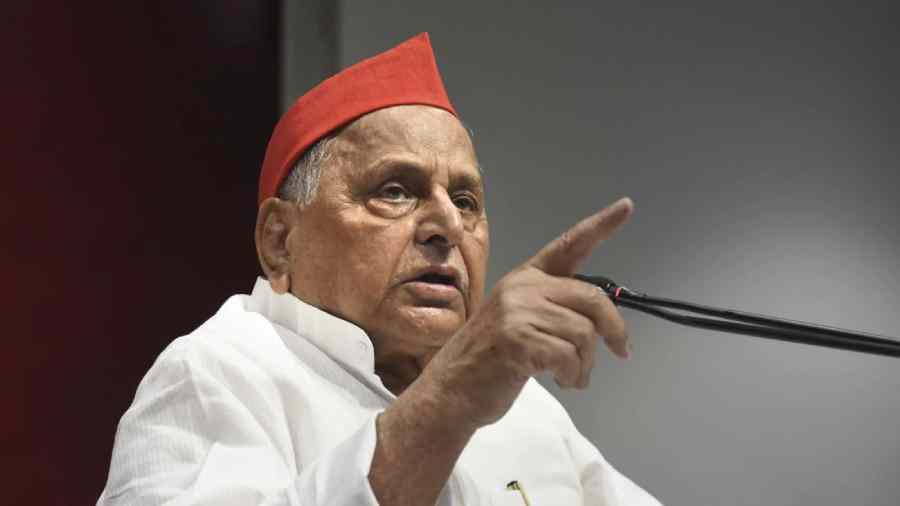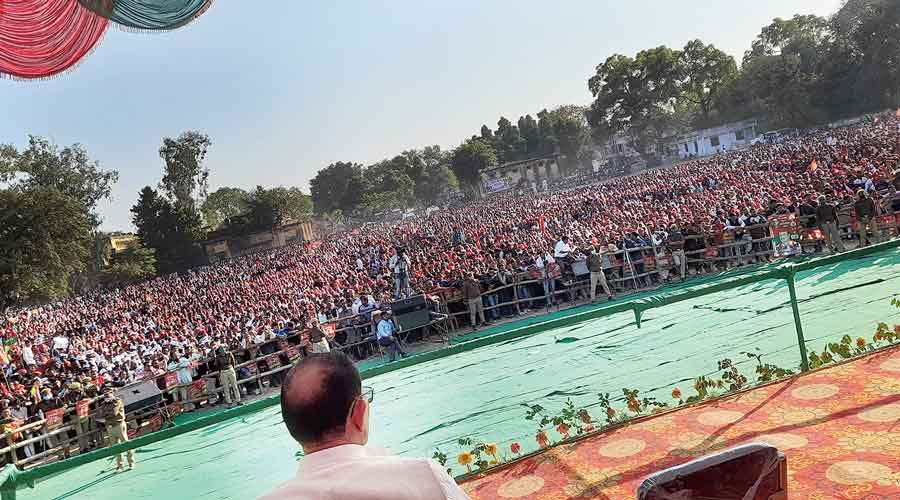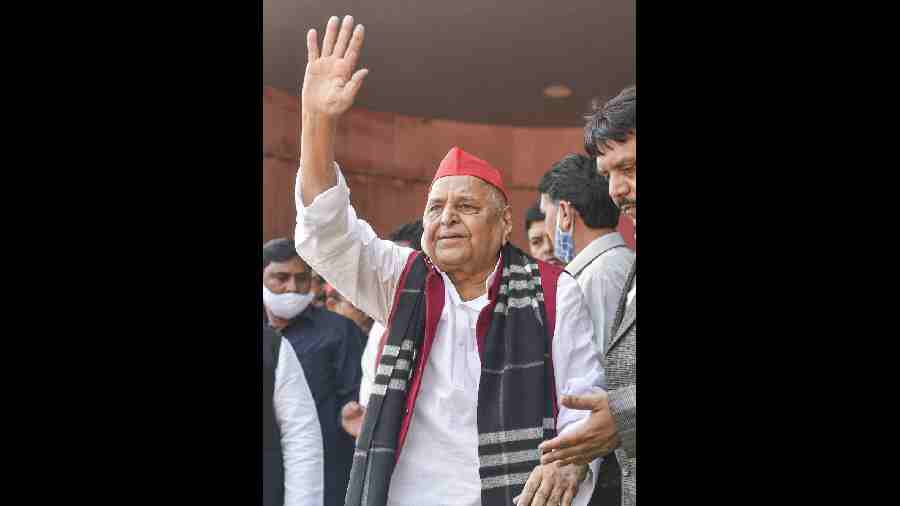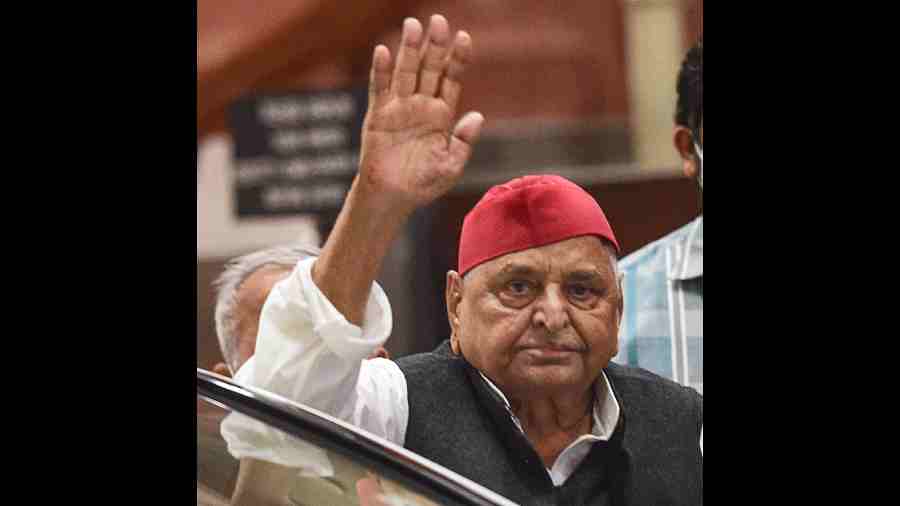- Mulayam Singh Yadav will be cremated in Saifai, his native village in Etawah district, on Tuesday around 3 pm
- Uttar Pradesh chief minister Yogi Adityanath announced a three-day state mourning as a mark of respect
Samajwadi Party supremo and three-time chief minister of Uttar Pradesh Mulayam Singh Yadav died on Monday at a hospital in Gurugram after prolonged illness.
"Mere adarniya pitaji aur sabke netaji nahi rahe - Akhilesh Yadav," the SP tweeted from its Twitter handle.
The 82-year-old former defence minister was admitted to a hospital since August and was shifted to the Intensive Care Unit of the Gurugram-based Medanta Hospital on October 2.
President Droupadi Murmu and Prime Minister Narendra Modi were among a host of leaders who condoled his passing away. Murmu said the achievements of Yadav, who came from an ordinary environment, were extraordinary.
"'Dharti Putra' Mulayam ji was a veteran leader and was connected with the land. He was respected by people of all parties. My deepest condolences to his family members and supporters! Murmu tweeted in Hindi.
The prime minister said Yadav served people diligently and devoted his life towards popularising ideals of Jayaprakash Narayan and Ram Manohar Lohia.
The Congress and BJP condoled Yadav's demise and said his passing away was an irreparable loss to Indian politics.
Uttar Pradesh Chief Minister Yogi Adityanath announced a three-day state mourning and said Yadav's last rites will be conducted with full state honours.
Born on November 22, 1939 into a farming family in Saifai near Etawah in Uttar Pradesh, Yadav spawned the state's most prominent political clan.
Yadv served as defence minister from 1996 1998, and chief minister thrice in 1989-91, 1993-95, and 2003-07.
The SP supremo was elected an MLA 10 times and an MP, mostly from Mainpuri and Azamgarh, seven times.
For decades, he enjoyed the stature of a national leader but Uttar Pradesh largely remained the akhara where Yadav played out his politics, beginning as a teenager who was influenced by socialist leader Lohia.
For party workers, even when he was no longer the SP president - the mantle passed on to his son Akhilesh Yadav in 2017 - the patriarch remained Netaji , the leader. And his presence on the scene provided the glue that held the Yadav clan together, at least to a degree.
A socialist , Yadav was open to possibilities in politics. Thanks often to mergers and splits, he had been affiliated with a series of parties -- Lohia's Sanyukt Socialist Party, Charan Singh's Bharatiya Kranti Dal, Bharatiya Lok Dal and Samajwadi Janata Party. He founded his own SP in 1992.
Yadav struck deals with the Bahujan Samaj Party, the Bharatiya Janata Party and the Congress whenever needed to form or save the governments led by him in Uttar Pradesh.
In 2019, Netaji sprang a surprise by praising Modi in Parliament, wishing that he would return as prime minister after the next election. This, when his party saw Modi's BJP as its main rival in UP. The remark baffled analysts.
Just as another comment, back in 2014 at a rally, triggered outrage when he spoke against the death sentence for rapists, saying boys make mistakes . And then, there was his advocacy of the idea that India, Pakistan and Bangladesh should form a confederation.
Yadav, who took part in student union agitations and briefly taught at an inter college after getting a Political Science degree, first became an MLA in 1967.
During his second term as MLA from the same constituency, Indira Gandhi declared Emergency and Yadav was sent to jail, like many opposition leaders.
Back in the ring after the 1975-77 Emergency, Yadav became the state president of the Lok Dal. When the party split, he headed one faction of the state unit.
Yadav was leader of Opposition in the UP Legislative Council and then in the state assembly, before becoming the chief minister in 1989 with the BJP extending outside support to his Janata Dal government.
When the saffron party withdrew support over the Babri Masjid-Ram Janmabhoomi issue in 1990, the Congress kept his government afloat for some months.
In November 1993, Yadav again headed a government in UP, supported by the BSP. It collapsed when the ally pulled the rug.
The SP leader then moved to the national stage, being elected to the Lok Sabha in 1996 from Mainpuri.
As opposition parties tried to form a non-BJP alternative to the Congress, Yadav briefly appeared to be in the fray for the prime minister's post.
But he ended up becoming the defence minister in the United Front government headed by H D Deve Gowda and the Sukhoi fighter jet deal with Russia was finalised during his term. Years later, he would be part of short-lived coalition of Janata Parivar parties that hoped to fight the 2015 Assembly elections in Bihar together.
In 2003, Yadav became UP chief minister for the third time after the collapse of a short-lived BSP-BJP coalition government.
In 2012, the SP was again in a position to form the UP government. But the senior Yadav stepped aside so that his son Akhilesh could become the state's youngest CM at 38.
But squabbling in the party and the family led to a coup of sorts by Akhilesh Yadav in 2017. Akhilesh, the son from his first wife Malti Devi - he later married Sadhna Gupta - was at loggerheads with the old guard that included uncle Shivpal Singh Yadav.
In the final years of his life, the ailing patriarch played a diminishing role in the affairs of the party that he had founded.














